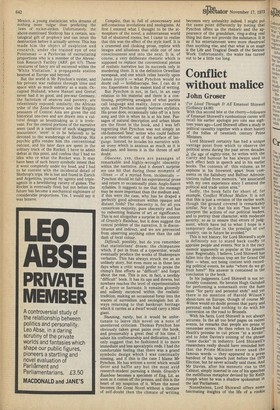Conflict without malice
John Groser
'I've Lived Through It All Emanuel Shinwell (Gollancz £4.00) With this second bite at the cherry—followers of Emanuel Shinwell's rumbustious career will recall his earlier apologia pro vita sua eighteen years ago—Lord Shinwell offers a study in political causality together with a short history of the follies of twentieth century Prime Ministers.
Lord Shinwell certainly has had a unique vantage point from which to observe the political arena during the past seven decades. tlie age of eighty-nine, he writes with the clarity and humour he has always used to such effect both in speech and in his earlier books. The contents of this volume, as he explains in his foreword, apart from comments on the Salisbury and Balfour Administrations culled from memoirs, "are associated with my own experience since I entered the political and trade union area."
Sadly, the book falls far short of, for example, Conflict Without Malice. It is not that this is just a revision of the earlier work, though the ground covered is remarkably similar. Nor is it that his aim "has been to interpret the actions of our political leaders, and to portray their character, with moderate severity, so as to ensure that errors of judgment, which have led to what I hope is a temporary decline in the prestige of our country, can in future be avoided." This is not history, for Lord Shinwell's style is definitely not to stand back cooMy to appraise people and events. Nor is it the racy memoir apparently so popular at the present time. Regrettably, I believe, Lord Shinwell has fallen into the obvious trap set for Grand Old Men — when, not being content with recording political events, he asks "where do we g0 from here?" His answer is contained in the conclusion to the book.
In his'judgments, Lord Shinwell is not noticeably consistent. He berates Hugh Gaitskell for performing a somersault over the Suez issue "for party and personal ends" and yet there is no mention of Harold Wilson's about-turn on Europe, though of course Mr Wilson would no doubt protest that party and personal ends had nothing to do with his conversion on the road to Brussels.
With his facts, Lord Shinwell is not alwaYs accurate. In the all too brief pages on recent events, he remarks that people are prone to remember errors. He then refers to Edward Heath's promise to cut prices "at a stroke'. and to John Davies's coining of the phrase "lame ducks" in industry. Lord Shinwell's researchers really should have reminded him that the Prime Minister never used the famous words — they appeared in a press handout of his speech just before the 1970 Election, but he never actually said them. And Mr Davies, after his meteoric rise to thei Cabinet, simply inserted in one of his speeches the mellifluous metaphor devised by Sir Keith Joseph when he was a shadow spokesman in the last'Parliament.
Nonetheless, Lord Shinwell offers some Fascinating insights of the life of a rookie
i!-abour MP at Westminster. The record of the rtY-twoof them at the outbreak of the Great thar "gives no cause for satisfaction, either on e grounds of Socialist principles or with a regard for the people they purported to ,represent," he says. That, of course, was 'efore he was elected to their midst. After the War, and after his election, the ,Y,c)ong Manny Shinwell is clearly dismayed by "le lack of understanding, by the sheer sense °I unreality, of the Tory hierarchy. He picks ';'n Lady Curzon tor saying of Bonar Law "he 'ooks more like a Labour MP than 'a Tory "An understandable description from IS exalted lady who had, however, ;studiously avoided meeting any Labour MPs," Lord Shinwell comments.
He enjoys recalling how Stanley Baldwin regarded him as one of the 'wild men' and he
n no way underestimates his own influence on
the first Labour Government. Many of his.
iriends in the Parliamentary Labour Party were of the view that "we should all remain cm the back benches and have nothing to do with ministerial office." His own feeling was
that "party unity was more important than the narrower interests of one area of the country or one facet of Socialist policy." He, therefore, remained true and was reasonably optimistic about the future fortunes of Ramsay MacDonald's ill-fated administration. Having been so closely involved with Labour leaders since the last War, it would have been good to read something really new and revealing about the crises within the Party since then; Lord Shinwell's special view of these events. Instead, he offers the now totally predictable comment of Clement Attlee about Richard Crossman being a "clever fool.".
No one can doubt that Lord Shinwell has lived through it all. The trouble with his new book is that at the end of it I have the unmistakable feeling that I have read through it all, before. And four pounds seems a great deal to pay for the privilege of doing so again. Still, most libraries have copies of Lord Shinwell's earlier version which, to my mind, is much the better.
John Groser is the Political Correspondent of .`The Times'



































 Previous page
Previous page